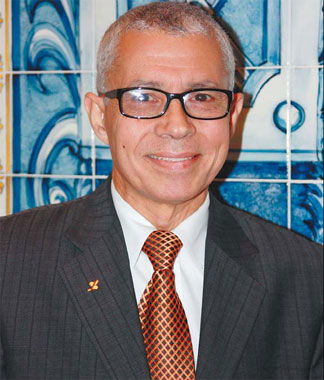Mario's delicious Porto call
|
Restaurant manager Mario Reis is an old China hand with his link to the country starting about two decades ago. Courtesy of Mario Reis |
Well-versed in many languages, including Portuguese, Spanish, French and English, restaurant manager Mario Reis was flummoxed when it came to Cantonese.
"It's a very difficult language, there are nine tones. I find Mandarin a little easier since it has only four," says the 59-year-old, one of thousands of Portuguese who have been drawn to China for adventure over the past 500 years.
"In any language I speak, my accent is terrible, but I don't think it's a problem as long as we can communicate," says the manager of the Camoes restaurant located in the Legendale Hotel in downtown Beijing.
While Reis has been in Beijing for just a little over a year, he is an old China hand, having moved to Macao in 1987 when it was ruled by Portugal.
"Portugal and China have always had good relations, we were the first Europeans to arrive here in the 16th century," he says.
Indeed, China's links with Portugal go back to 1557, when the Portuguese set up a permanent settlement in Macao and paid the Chinese emperor 500 taels of silver a year in rent. The Chinese government regained full sovereignty on December 20, 1999.
In a measure of these continuing close links, the proposed visit by Chinese President Hu Jintao to Lisbon earlier this month was to be accompanied by a delegation of some 200 Chinese businessmen.
Reis has been with the restaurant since it opened last October. "During the Olympics, this hotel (Legendale) was appointed as one of the Olympic hotels, so we were operating shortly before the actual opening. We cooked for athletes from over 20 states, so it was like training for us," he says.
Professing a great love for Beijing and its inhabitants, he says: "It's a big city, everything is here. It's not too crowded, and I am very happy to be here."
In Macao too, Reis managed the Camoes. "It is named after Portugal's national poet. The owner of these restaurants came up with a concept that would integrate Portuguese culture with the cuisine, and named it after this historical figure," explains Reis.
"I worked for many years as a chef in Portugal and Macao. I left the kitchen a few years ago to go into public relations and managing, it was a nice challenge for me."
Reis now leaves the cooking up to two Portuguese chefs. "They worked at two of the best restaurants in Lisbon. We like to give space to our chefs to be creative," he says.
He estimates there are around 40 working Portuguese in Beijing, mostly embassy officials.
"I know many of the Portuguese here, they come to this restaurant often."
Although he occasionally misses his home country, Reis believes he will be in China for a while.
"My oldest son is in Macao, I have two adopted Chinese kids that study in England, and the rest of my family is in Portugal.
"I've lived outside my country for many years, so I have roots all over the world. I'm a bit divided, but I'm not homesick often," he says.
While there may only be small numbers of Portuguese professionals operating in China, there is a growing group of students moving to the mainland.
Carlos Rego considers himself among the first new wave of Portuguese to come to China to live and work.
The 22-year-old, who has been studying business Chinese at Beijing Language and Culture University since February, believes more of his compatriots will soon begin coming to China.
Rego chose to study Chinese because of its growing economic importance and the fact that few of his compatriots have studied the language.
He believes this means he could get a job helping companies from his homeland do business with Chinese firms.
"I hope to become the manager and interpreter," he says, adding that the main obstacle to the flow of people from his homeland to China has been a fear that the host country is too difficult to acclimate to.
"I was afraid, too, but I've had no problem adapting to the food, to the people, to the culture," he says.
"As soon as this feedback gets around Portugal, when people go back home and tell others, then more people will start coming here."
He says he hasn't met another Portuguese off campus, but believes the Chinese government's offer of scholarships to overseas students is a good way to improve contact between the two cultures.
"We're a migrating country. We've been all over the world, and if China keeps selling its brand to the world, more people will come," he says.
He says there are many similarities between the two cultures, such as a willingness to help strangers, which make it easier for Portuguese to adapt to China.
In addition, many Chinese people know about his homeland through football and Portuguese stars like Cristiano Ronaldo.
"So when I sit in a cab and the driver asks me where I'm from and I say Portugal, we've already got a lot to talk about," he says, laughing.
(China Daily 07/20/2009 page10)















